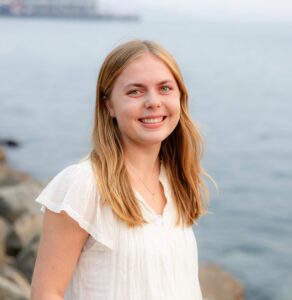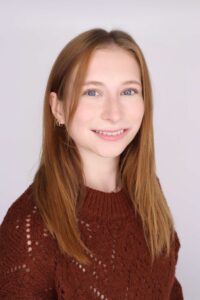MEET PENN HILL’S SPRING INTERNS: ELLE JONES AND MEREDITH KUHL
Meet Penn Hill Group’s Spring interns, Elle Jones and Meredith Kuhl. Elle is a Junior at Pomona College, majoring in Public Policy Analysis, with a concentration in Politics, and a minor in Mathematics. Meredith is a student at Indiana University – Bloomington, where she will be graduating this December. Meredith is majoring in Law and Public Policy and minoring in History and Education Policy. Learn a little bit about each of them below!

Elle Jones
Why did you decide to spend a semester in DC?
A core part of the public policy analysis major at Pomona is the semester-long internship, and that was one of the main reasons I chose the major in the first place. I was drawn to the chance to spend time in DC and engage directly with policy in a hands-on manner. The opportunity to work full-time and in person on education policy—especially at such a transitional moment with a new Administration coming in—really resonated with me. It felt like the kind of experience that would bring what I’d learned in the classroom to life.
What do you hope to do or learn during this internship?
While I’ve had some exposure to state-level education policy, I’m excited to build on that by gaining a better understanding of the Federal side. I want to see how national education policy is shaped and what that process looks like day-to-day. I’m particularly interested in how political dynamics influence decision-making, and I hope to leave this internship with a clearer sense of how the responsibilities of supporting students are split between Federal, State and local governments. Ideally, I’ll come away with a fuller picture of how the system works and how I might fit into it long-term.
What interests you most about education?
What really draws me to education is its dual role: it’s not just about academic growth, but also about shaping young people into engaged, thoughtful members of society. I’m especially interested in how education policy can create structures that support all aspects of student development—inside and outside the classroom. It feels like one of the most direct ways to support equity and opportunity at scale.
What are some of your future goals?
I’d love to be part of the policymaking process and see how a policy idea can move through different levels of government and eventually become something that’s implemented in real schools. That kind of full-circle moment is exciting to me. In the long term, I’d love to pursue a master’s degree in public policy, and I could see myself working in K-12 policy at the State level or returning to some form of education consulting. In short, there are so many things I want to do, but for right now I’m just excited to spend my last year of college further immersing myself in the world of public policy!

Meredith Kuhl
Why did you decide to spend a semester in DC?
I knew it was time to get out of my shell as I am an Indiana Hoosier born and raised. There is so much outside the Midwest I have yet to see. To enter the policy space effectively, I believe you need a robust understanding of the way varying levels of government interact and how public-private partnerships meet needs. That’s why Indiana University’s Washington Leadership Program stood out—it was an opportunity I couldn’t pass up.
What do you hope to do or learn during this internship?
I hope to develop my communication style, namely through interactions with client teams, which is a new experience for me, and written materials in the field, which require concise and purposeful wording in a way I had learned about in school but had yet to apply. I also aim to learn more about the role of the Federal government in education, which in my experience, is oftentimes a State and local level conversation.
What interests you most about education?
The potential of education is what excites me the most. More specifically, education is one of the few mechanisms through which people can change their lives in what has been an increasingly stagnant and regimented society. Our education system reflects the ability of our nation to progress, and the inclusion of all people, regardless of skin color, socioeconomic status, or ability is key towards a more harmonious future. This is another reason why I find history so important. Both subject areas require us to acknowledge our past injustices, against students of color and students with disabilities, for instance. We can choose to reconcile systemic inequities today so long as we invest in both education and the teaching of accurate history.
What are some of your future goals?
I would like to continue in the education space by facilitating implementation of research-based policies to increase equitable outcomes for youth. I intend to go to graduate school next Fall to attain an education policy degree and gain a further understanding of policy-building at the State and local levels. Continuing with research in some capacity is also a priority. My opportunities for education undoubtedly shaped my life, and I believe it is my responsibility to ensure future generations of students have that same level of access. After what is hopefully an impactful career, I would love to become a professor and help shape new cohorts of young people committed to public service.